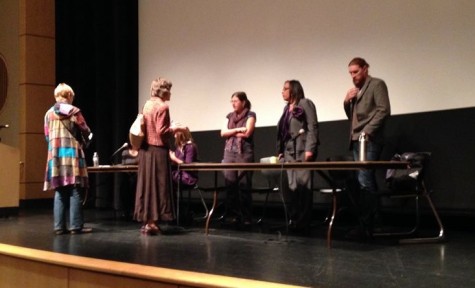Food Day comes to Akron
October 27, 2014
Food Day, which was hosted by The University of Akron School of Law at the Akron Public Library auditorium on Oct. 26 at 1:30 p.m., focused on the American food epidemic. This is the fourth year that UA has hosted the event.
The event started with Sarah Morath, associate professor of Legal Writing at UA, introducing what Food Day is all about.
The main objective of Food Day is to help promote safer and healthier diets, sustainable and organic farms, reduce hunger, reform factory farms to protect the environment and support fair working conditions for workers.
“I love that when we start talking about where our food comes from and how it is produced, robust discussions about the environment, economic development, and healthy eating emerge,” Morath said. “My sister is a small organic farmer outside Dayton, so I’m always thinking about how policies might help that subset of farmers,”
The documentary, Apple Pushers, was played for the audience to view. It follows the unique stories of five different immigrant pushcart vendors, originating from Ecuador, Russia, Mexico and Bangladesh. All five immigrants have one common goal: to roll as much fresh fruit and vegetables into New York City’s food deserts, neighborhoods where finding fresh produce is a challenge in itself. This is the heart of the Green Cart Initiative which seeks to enlarge the availability of fresh produce in underprivileged communities to combat the obesity epidemic.
Apple Pushers elaborated on the importance of holistic foods, food found in its natural state, as well as showing that anyone can create opportunities.
After the movie finished, five speakers came to the stage to speak on Food Day and the documentary.
The five speakers were Liberty Merrill, Land Reuse Director of Youngstown’s Neighborhood Development Corporation, Brian A. Estabrook, Research Assistant of Growing Food Connections, Cathy Vue, Assistant Manager of Asian Services in Action’s Community Health, Evaluation and Research Institute, Lisa Nunn, Executive Director of Let’s Grow Akron, and Veronica Sims, special projects and government affairs administration of Akron Summit Community Action.
Each had their own point of view and shared their ideas on holistic eating.
They recommended incorporating holistic eating into everyday conversation as much as possible and to increase awareness in general.
The most common idea was to change policy through education. In order for policy to change, it requires educating as many people as possible on the benefits of holistic eating.
UA offers healthy eating options, but there is always room for improvement.
When asked if campus could opt for healthier eating options, Morath said, “I think that there is a lot of growth that can happen on campus when looking at food options for students. I’m encouraged that students would like healthier and more nutritious food options. Many universities provide locally sourced food for students. The same can happen at Akron, but students will have to ask for it.”
Although Food Day is still in its early stages, there were over 8,000 events supporting Food Day priorities this year. Books and movies educate the public at a national level. At the local level, people can become part of a local food policy coalition or start one if there is none in their community.
“The food movement is a social movement, full of concerned citizens like you and me,”Morath said.
For more information on the documentary Apple Pushers, you can go to http://www.applepushers.com

Panelists discussed the importance of holistic foods

Panelists gather after their lecture











